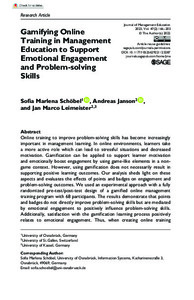Gamifying Online Training in Management Education to Support Emotional Engagement and Problem-solving Skills
| dc.date.accessioned | 2023-04-24T11:19:57Z | |
| dc.date.available | 2023-04-24T11:19:57Z | |
| dc.date.issued | 2022-09-28 | |
| dc.identifier | doi:10.17170/kobra-202304057777 | |
| dc.identifier.uri | http://hdl.handle.net/123456789/14627 | |
| dc.description.sponsorship | Gefördert im Rahmen eines Open-Access-Transformationsvertrags mit dem Verlag | ger |
| dc.language.iso | eng | eng |
| dc.rights | Namensnennung 4.0 International | * |
| dc.rights.uri | http://creativecommons.org/licenses/by/4.0/ | * |
| dc.subject | gamification | eng |
| dc.subject | learning | eng |
| dc.subject | emotional engagement | eng |
| dc.subject | problem-solving skills | eng |
| dc.subject | satisfaction | eng |
| dc.subject | management training | eng |
| dc.subject | goal orientation | eng |
| dc.subject.ddc | 370 | |
| dc.title | Gamifying Online Training in Management Education to Support Emotional Engagement and Problem-solving Skills | eng |
| dc.type | Aufsatz | |
| dcterms.abstract | Online training to improve problem-solving skills has become increasingly important in management learning. In online environments, learners take a more active role which can lead to stressful situations and decreased motivation. Gamification can be applied to support learner motivation and emotionally boost engagement by using game-like elements in a non-game context. However, using gamification does not necessarily result in supporting positive learning outcomes. Our analysis sheds light on these aspects and evaluates the effects of points and badges on engagement and problem-solving outcomes. We used an experimental approach with a fully randomized pre-test/post-test design of a gamified online management training program with 68 participants. The results demonstrate that points and badges do not directly improve problem-solving skills but are mediated by emotional engagement to positively influence problem-solving skills. Additionally, satisfaction with the gamification learning process positively relates to emotional engagement. Thus, when creating online training programs, it is essential to consider how to engage students and to think about the design of the learning environment. By identifying the limitations of gamification elements, the study’s results can provide educators with information about the design implications of online training programs for management learning. | eng |
| dcterms.accessRights | open access | |
| dcterms.creator | Schöbel, Sofia Marlena | |
| dcterms.creator | Janson, Andreas | |
| dcterms.creator | Leimeister, Jan Marco | |
| dc.relation.doi | doi:10.1177/10525629221123287 | |
| dc.subject.swd | Gamification | ger |
| dc.subject.swd | Lernen | ger |
| dc.subject.swd | Emotionales Verhalten | ger |
| dc.subject.swd | Problemlösen | ger |
| dc.subject.swd | Management | ger |
| dc.subject.swd | Schulung | ger |
| dc.type.version | publishedVersion | |
| dcterms.source.identifier | eissn:1552-6658 | |
| dcterms.source.issue | Issue 2 | |
| dcterms.source.journal | Journal of Management Education | eng |
| dcterms.source.pageinfo | 166-203 | |
| dcterms.source.volume | Volume 47 | |
| kup.iskup | false |
Dateien zu dieser Ressource
Das Dokument erscheint in:
-
Artikel [1106]


